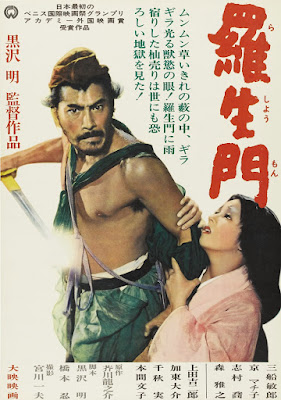 |
| Fig 1 - Rashomon Poster |
I really wanted to like this movie more than I did. The opening gives an incredible hook, just from the sheer horror on the faces of the men recounting the tale and their assurance that this event that happened was too despicable, too disturbing and awful to recount, as if reading from the opening of a Lemony Snicket book. But what ensues happens to be much more of a fable about the nature of truth and the way in which man should not trust even his own recollection of the facts. Toshiro Mifune (as seen on the poster) gives an excellent performance as Tajomaru incidentally, whose erratic and unpredictable delivery gave almost a 'folklore' element to his character.
 |
| Fig 2 - Rashomon - Tajomaru in court |
Rashomon is not a bad film by any means. The cinematography by Kazuo Miyagawa gave an incredibly rich atmosphere to its setting. Hell, it even coined the phrase 'The Rashomon Effect' as a term to describe an unreliable narrator. I just didn't feel I particularly gained anything from it, and as much as I can appreciate it, I am unlikely to watch again.
★★★
Imagery
Fig. 1 Rashomon Poster (1950) From: Rashomon - Directed by: Akira Kurosawa
https://blogger.googleusercontent.com/img/b/R29vZ2xl/AVvXsEiaGoWYb1cSzI5QNv6o1qOgta0BQdoGswmGuQJaYmPq3soH2L34G-jZf9rNWOhMWlpylOaSP5Ww1djSg_L0j76PqNEJaF6KFVvfv1Tiiz5iwj8VGtEKJ6EZwc6r2Ra12TVa18C9orFycf0/s1600/RASHOMON+-+Japanese+Poster+2.jpeg
Fig. 2 Rashomon Screenshot (1950) From: Rashomon - Directed by: Akira Kurosawa
http://akirakurosawa.info/wp-content/uploads/2015/07/Rashomon-court.jpg

No comments:
Post a Comment